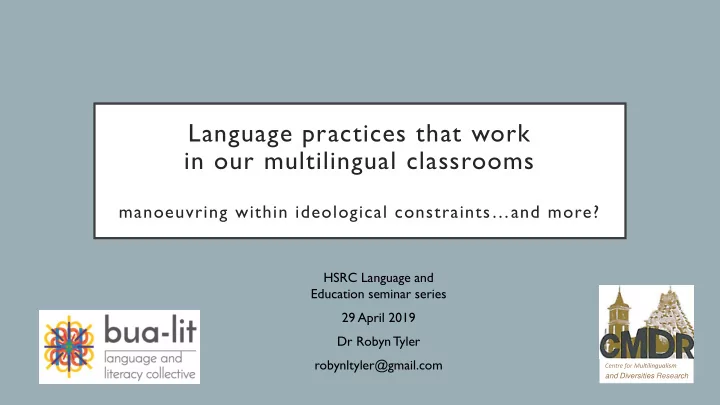

Language practices that work in our multilingual classrooms manoeuvring within ideological constraints…and more? HSRC Language and Education seminar series 29 April 2019 Dr Robyn Tyler robynltyler@gmail.com Centre for Multilingualism and Diversities Research
Presentation Plan 1. Current Language in Education Policy 2. The ideological underpinnings of L in E policy 3. Our learners 4. What does translanguaging have to offer as a descriptive concept in our context? 5. Teasing out translanguaging in education using data from a Khayelitsha high school 6. Ideas for making learning at school work better for our children
Current language in education policy - schooling LiEP 1997 CAPS 2011 School language policies: official and tacit
The ideological underpinnings of L in E policy in SA • Monoglossic ideologies • Anglonormativity ‘Language ideologies misdirect our attention from the real problems in language and literacy teaching… (and this) “misrecognition” of the problem also prevents productive solutions through heteroglossic approaches to language use’ (McKinney, 2017, p.71)
ABANTWANA BETHU* Translanguaging (Garcia and Li Wei, 2014; Makalela, 2014/2015; Madiba, 2014; Probyn, 2015; Li Wei, 2017; Jaspers, 2017; Antia, 2017; Guzula, McKinney & Tyler, 2016; Tyler, 2018)
Bilingualism in the 21st century Garcia, Sylvan and Witt, 2011; Garcia and Kleifgen, 2010
Data: Success high case study
‘ MANOUEVRING ’ (PHAKENG, 2017) • ‘Smuggling in the vernacular’ (Probyn, 2009) • Code-switching Natural Science Grade 9 test: • Natural translanguaging in How is the arrangement of electrons in Neon adaptive translanguaging similar to the arrangement in Helium? spaces (Garcia & Li Wei, Mbulelo 2014) Grade 9 learner: uyabona kaloku iHydrogen iyimolecule yona i-exista zibayitwo zona xa iexistayo
BEYOND MANOUEVRING: OFFICIAL TRANSLANGUAGING STRATEGIES • Translating between written registers (Lemke, 1990) • Creating new registers for Science learning • making the grammar of the English Science register explicit with reference to another register • T eaching critical language awareness with reference to the written English Science register
Official translanguaging develops conceptual rigour Ha a why i-molecule of water is H2O…water is H2O, it’s the same thing! Thandile’s written version: ‘for example one molecule of H2O/water has 2 hydrogens’ like Thandile sine-water Yonela’s : uba like one molecule yalamanzi ‘for example one molecule of water is H2O’ (like Thandile we have water , if like one molecule of this water)
Making learning at school work better: a decolonial imperative 1. Create established translanguaging spaces in schools (Garcia & Li Wei, 2014). 2. Teach teachers pedagogies which embrace official translanguaging (ibid.) 3. Change L in E policy to make the goal of language in education an expanded repertoire (Lin, 2015) which includes both familiar and standardised registers. 4. Enable all teachers to be critical literacy teachers (Janks, 2010) 5. Create multilingual materials in language and content subjects.
Selected References and questions • Banda, F. (2010). Defying monolingual education: alternative bilingual discourse practices in selected coloured schools in Cape T own. Journal of Multilingual and Multicultural Development, 31 (3), 221-235. • García, O. & Li Wei. (2014). Translanguaging: language, bilingualism and education . Basingstoke: Palgrave Macmillan. • Guzula, X., McKinney, C., & Tyler, R. (2016). Languaging-for-learning: Legitimising translanguaging and enabling multimodal practices in third spaces. Southern African Linguistics and Applied Language Studies, 34(3), 211 – 226. • Janks, H. (2010). Language, power and pedagogies. In N. H. Hornberger & S. L. Mackay. Sociolinguistics and Language Education , (pp.40 – 61). Bristol: Multilingual Matters. • Lin, A. M. Y. (2015). Egalitarian Bi/Multilingualism and Trans-semiotizing in a Global World. In W. E. Wright, S. Boun, & O. Garcia (Eds.), Handbook of Bilingual and Multilingual Education (pp. 19 – 37). Hoboken, N J: Wiley-Blackwell. • Makalela, L. (2015). Translanguaging as a vehicle for epistemic access: cases for reading comprehension and multilingual interactions. Per Linguam, 31(1), 15 – 29. • McKinney, C. (2017). Language and power in post-colonial schooling: ideologies in practice. New York: Routledge. • McKinney, C. & Tyler, R. (2018). Disinventing and reconstituting language for learning in school Science. Language and Education , 1-19. • Probyn, M. (2015). Pedagogical translanguaging: bridging discourses in South African science Centre for Multilingualism classrooms. Language and Education, 29(3), 218 – 234. and Diversities Research
Recommend
More recommend